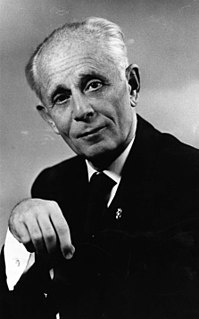A Quote by Albert Einstein
The most beautiful emotion we can experience is the mystical. It is the power of all true art and science. He to whom this emotion is a stranger, who can no longer wonder and stand rapt in awe, is as good as dead. To know that what is impenetrable to us really exists, manifesting itself as the highest wisdom and the most radiant beauty, which our dull faculties can comprehend only in their most primitive forms - this knowledge, this feeling, is at the center of true religiousness. In this sense, and in this sense only, I belong to the rank of devoutly religious men.
Quote Topics
Art
Art And Science
Awe
Beautiful
Beauty
Belong
Center
Comprehend
Dead
Dull
Emotion
Exists
Experience
Faculties
Feeling
Forms
Good
Highest
Itself
Know
Knowledge
Longer
Men
Most
Most Beautiful
Mystical
Only
Our
Power
Primitive
Radiant
Radiant Beauty
Rank
Really
Religious
Science
Sense
Stand
Stranger
True
True Art
Us
Which
Whom
Wisdom
Wonder
Related Quotes
There are two ways to live: you can live as if nothing is a miracle; you can live as if everything is a miracle. The most beautiful thing we can experience is the mysterious. It is the source of all true art and all science. He to whom this emotion is a stranger, who can no longer pause to wonder and stand rapt is awe, is as good as dead: his eyes are closed.
I cannot then believe in this concept of an anthropomorphic God who has the powers of interfering with these natural laws. As I said before, the most beautiful and most profound religious emotion that we can experience is the sensation of the mystical. And this mysticality is the power of all true science.
The fairest thing we can experience is the mysterious. It is the fundamental emotion that stands at the cradle of true art and true science. It is the source of all true art and science. He who knows it not and can no longer wonder, no longer feel amazement, is as good as dead, a snuffed-out candle.
I said before, the most beautiful and most profound religious emotion that we can experience is the sensation of the mystical. And this mysticality is the power of all true science. If there is any such concept as a God, it is a subtle spirit, not an image of a man that so many have fixed in their minds. In essence, my religion consists of a humble admiration for this illimitable superior spirit that reveals itself in the slight details that we are able to perceive with our frail and feeble minds.
The fairest thing we can experience is the mysterious. It is the fundamental emotion which stands at the cradle of true science. He who knows it not, and can no longer wonder, no longer feel amazement, is as good as dead. We all had this priceless talent when we were young. But as time goes by, many of us lose it. The true scientist never loses the faculty of amazement. It is the essence of his being.
The further limits of our being plunge, it seems to me, into an altogether other dimension of existence from the sensible and merely understandable world. Name it the mystical region, or the supernatural region, whichever you choose. So far as our ideal impulses originate in this region (and most of them do originate in it, for we find them possessing us in a way for which we cannot articulately account), we belong to it in a more intimate sense than that in which we belong to the visible world, for we belong in the most intimate sense wherever our ideals belong.
What makes art Christian art? Is it simply Christian artists painting biblical subjects like Jeremiah? Or, by attaching a halo, does that suddenly make something Christian art? Must the artist’s subject be religious to be Christian? I don’t think so. There is a certain sense in which art is its own justification. If art is good art, if it is true art, if it is beautiful art, then it is bearing witness to the Author of the good, the true, and the beautiful
No one suffers so much as he [the genius] with the people, and, therefore, for the people, with whom he lives. For, in a certain sense, it is certainly only "by suffering" that a man knows. If compassion is not itself clear, abstractly conceivable or visibly symbolic knowledge, it is, at any rate, the strongest impulse for the acquisition of knowledge. It is only by suffering that the genius understands men. And the genius suffers most because he suffers with and in each and all; but he suffers most through his understanding. . . .




























